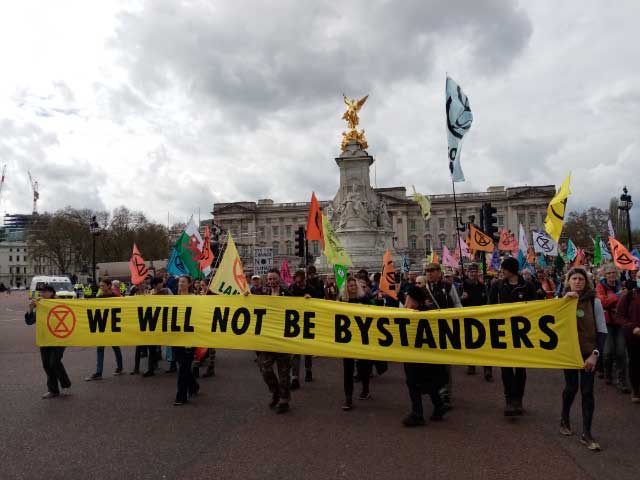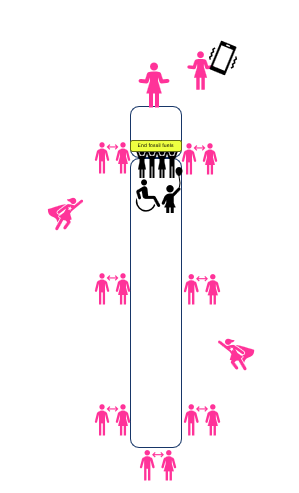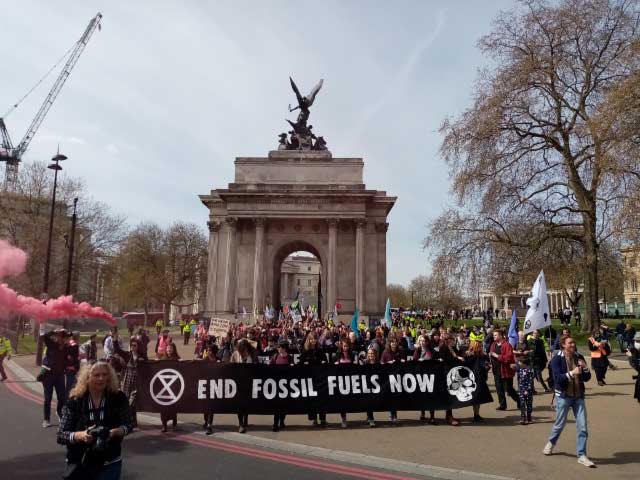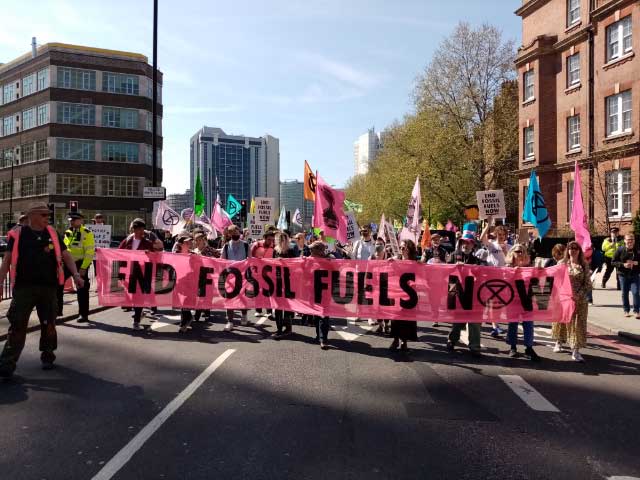Planning & Stewarding a March
Training
- Training is available on this topic- email us at stewarding@extinctionrebellion.uk for details.
- A 30min video of the training is available: Planning a Protest March.
- And a set of PowerPoint slides with embedded video animations is available if you want to run training with your team.
Preparation
Strong preparation is absolutely key to pulling off an effective march. And the bigger the march will be, the more key preparation will be to success.
These are the elements you should consider when planning a march:
- What is the purpose of the march? This will help you plan the route, and decide what elements you want to include.
- Plan the route. Recce at similar time of day and day of the week as the march is planned to take place on. Take photos of junctions so that roadtake teams can plan. Consider alternatives in case you need to shorten or lengthen the route depending on numbers. In general we march in the same direction as traffic.
- Document the route - Google MyMaps is ideal as it allows a team to edit, add notes for stages and then share their final route plan.
- Notify the police. The law states 6 days in advance and you need to give name of organiser. You do not need permission from the police, just evidence you have notified them (which you will get by email receipt). In almost all cases it makes sense to notify the police, as marches are usually pitched as family friendly parts of a protest and the police will sometimes assist with road closures. We would recommend contacting our XR Protest Liaison team for advice, they will be happy to use their details on the notification forms.
- Plan main banners, roadtake banners, other flags and visuals. Give as much notice as possible to the creative teams if new banners are required.
- Will Rhythms or other bands be involved and do they have enough notice?
- Where will the march assemble? Large open spaces are best as they allow crowds to assemble easily in sequence.
- How will the march disperse at the end of the route, or is there another event following the march, that takes place at a specific time?
Media & Messaging
- How will the march be publicised?
- Create visuals and copy for broadcast channels, Facebook, press releases etc.
Roles Involved
Chances are you will need a support team to help your march run smoothly. Here is a list of roles often required on actions.
Note: not every march will have all of these roles and some of them may be combined.
The day of the March
- Recce the route again. Roadworks or other unplanned barriers have been known to occur overnight.
- Check you have all the expected banners/flags/etc.
- Ensure you have enough people recruited for roadtaking, and that they are trained and confident? If they need a quick recap, make sure this happens.
- Ensure Stewards present and briefed on the march route.
- Assuming the march is pre-liased, have Protest Liasion connecte dto Police Liasion?
Starting the March
- Assemble the march block(s)
- Front March Leader / Point Steward (who will be walking backwards)
- Empty space (area kept clear for photographers to get clear shots of front banner)
- Main Banner
- Slowest marchers (ideally you want these near the front of a march to set the pace, however they may not want to be there, may not like the noise from Druimmers, etc.)
- Body of march
- Rhythms/Samba
- Body of march
- Rhythms/Samba
- Tail of March
- When march coordinator is happy, whatever signal has been agreed beforehand is given to start. This will usually be the Front March Leader signalling to the front banner holders to move forwards via hand gestures.
Progressing the March
- March Speed / Gaps
- Gaps are inevitable, you just want to avoid them getting too big as traffic will then try and get through.
- Stopping and restarting a march is difficult, better to slow the front right down to wait for gaps to close.
- Communications from stewards along the march length is critical to judge appropriate march speed - slower is better.
- To communicate with Rhythms/Samba contact them via the Samba Shepherd (with a lamb on a stick), or speak to the whistler's supporter (usually walking backwards alongside the whistler).
- Roadtaking
- See separate Training for Road Take crew.
- Usually this crew will be recruited on the day supplemented by Banner Holders and some Stewards to guide them.
- See separate Training for Road Take crew.
- Speeches enroute
- Avoid if at all possible as people will stop to listen and this will create gaps.
- One solution is to pause the whole march but only a small section near the PA will be able to hear any speeches.
Photos of Marches
Video of a large Biodiversity march April 2023





